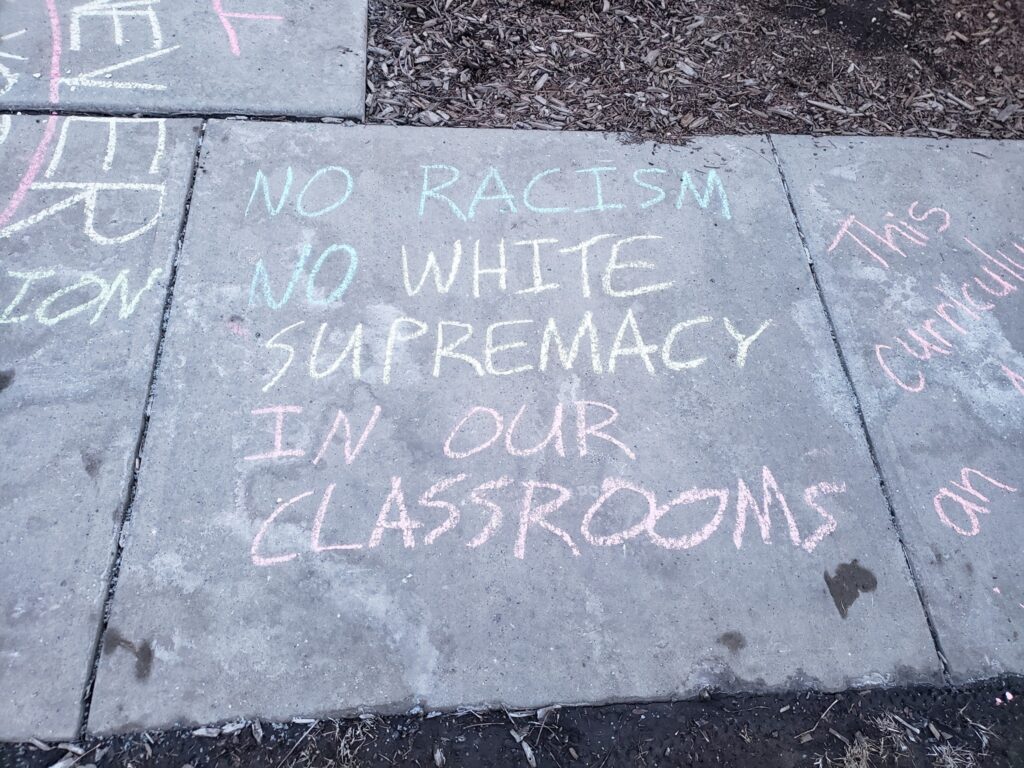This post was first published by Nicole Patrie, MEd and Danielle E. Lorenz, MA on May 5, 2021 on https://csse-scee.ca/blog/alberta-draft-curriculum-class-by-itself/
In late March, Alberta Education released its latest draft of the proposed K-6 curriculum. The draft documents were immediately the source of outrage, disappointment, and, symbolic of internet culture and our current era, the development of memes. The curriculum has been described by academic experts as developmentally inappropriate;[1] presenting a settler colonial understanding of Albertan, Canadian, and world history and Indigenous-settler relationships;[2] ignoring educational research;[3] and containing content plagiarized from a number of sources.[4] A Facebook group opposing the changes has ballooned to almost 40,000 members. Currently, 50 out of 61 school boards have decided not to partake in piloting the curriculum this September.

In other words, it’s an unteachable disaster, in two distinct ways. First, teachers and children should not be subjected to it. We understand the mass public outcry including memes, chalk drawings, yard signs, and petitions to be indicative of widespread critique; although many have acknowledged that their ability to critique is limited by their lack of pedagogical expertise. Second, as junior education scholars who hope to prepare pre-service teachers, we cannot in good conscience teach them how to teach such problematic content. Engaging and inclusive pedagogical strategies are contrary to the values and ideals implied in the curriculum.
CSSE-SCEE members, by means of their research and teaching activities, are involved in specific areas of subject mastery (e.g., English Language Arts, Social Sciences, Fine Arts, French Language and Literature, Mathematics, Science) or more abstract competencies (e.g., critical thinking, inquiry, analysis, and civic literacy) with pre- or in-service teachers. If this curriculum is taught in Alberta classrooms, children who are beginning their K-12 education journey will be exposed to the antiquated concepts and ideas presented in this program of studies. Though at present only children from Alberta are threatened by this eventuality, we are concerned it might become precedent-setting and similar curricula may be developed in other provinces. This curriculum must be addressed now. Otherwise, in seven years when these children reach post-secondary education institutions, they will be underprepared for the classrooms and pedagogical approaches that value equity, diversity, inclusion, and decolonization. More broadly, this curriculum does not reflect the values we would like to see in our society.

With Congress of the Humanities and Social Sciences hosted, albeit virtually, at the University of Alberta (our institution), we are urging our fellow educationalists to join us in condemning the draft. The theme of Congress this year is “Northern Relations.” The Alberta program of studies, in this draft form, represents a turning back on Northern Relations. It does not encourage connection, community, culture, or alternative ways of knowing. The pressing issues of “climate change, governance, social justice, anti-Black racism, decolonization, reciprocity, education,”[5] and others, identified by the Federation for the Humanities and Social Sciences are not presented in this curriculum.
As Dr. Jacqueline Ottmann reminds us in the President’s Welcome, since the beginning of the COVID-19 pandemic being felt in what is presently called Canada, “we have seen the multi-dimensionality of injustice. Consequently, many began the hard work of reparation, healing, relationship-building, acknowledging the importance of diversity, systemically and structurally reorganizing to become genuinely inclusive and equitable through decolonial means.” Indeed, this points directly to the release of Igniting Change: Final Report and Recommendations of the Congress Advisory Committee on Equity, Diversity, Inclusion, and Decolonization last month. In considering the words of Dr. Ottman and the Congress Advisory Committee we are reminded that concerns around accessibility, diversity, decolonization, equity, inclusion, and inherent human dignity – which, in many ways, have and continue to inform our work and praxis, in academia and beyond – are integral to all educational communities. In the draft curriculum, these ideals and values are actively undermined, implicitly and explicitly.
For this reason, we implore that the Canadian Society for Studies in Education join us in publicly opposing the slapdash and substandard draft of Alberta’s K-6 curriculum. Specifically, CSSE-SCEE represents the community of educational researchers and scholars in Canada, many of whom are engaged in the work of training pre-service teachers. Teachers who will be required to teach, and by extension uphold, this curriculum, regardless of its many (many) issues.

We suggest three ways that you can add your words to the growing collective of voices.
First, you can add your thoughts about the curriculum to social media. If you’re on Twitter, there is regular discussion on the program of studies in the #AbEd and #AbLeg hashtags. We (@daniellelorenz and @patrie_nicole) would love to signal boost you.
Second, you can encourage your CSSE-SCEE SIGs, departments, and Faculties of Education to speak out with formal letters.
Finally, a website has been created by Drs. Carla Peck, Sarah Elaine Eaton, and Angela Grace, with support from the Association of Alberta Deans of Education, to provide “research-informed scholarly and expert advice.” Consider contributing analysis or commentary about a section of the proposed curriculum that intersects with your expertise.
We respectfully argue that the time leading up to and during Congress 2021 is the best time for Canadian academics to make a stand against such a problematic and regressive curriculum. Together, we can present a unified voice in favour of a curriculum that helps to prepare children for the type of society in which we would like to live.

[1] https://www.cbc.ca/news/canada/calgary/road-ahead-alberta-education-curriculum-criticism-1.5978023
[2] https://edmontonjournal.com/opinion/columnists/opinion-albertas-draft-social-studies-curriculum-will-hinder-students
[3] https://werklund.ucalgary.ca/aade-statement
[4] https://www.theglobeandmail.com/canada/alberta/article-academic-finds-sections-of-albertas-draft-school-curriculum-are/
[5] https://congress2021.ca/about
Nicole Patrie, MEd is a PhD student in Education Policy Studies at the University of Alberta, studying prison education. Over the past 15 years she has taught and developed curriculum at junior high to university levels.
Danielle E. Lorenz, MA is a PhD candidate in the Department of Educational Policy Studies at the University of Alberta. Her dissertation research focuses on settler colonialism in mainstream systems of education.